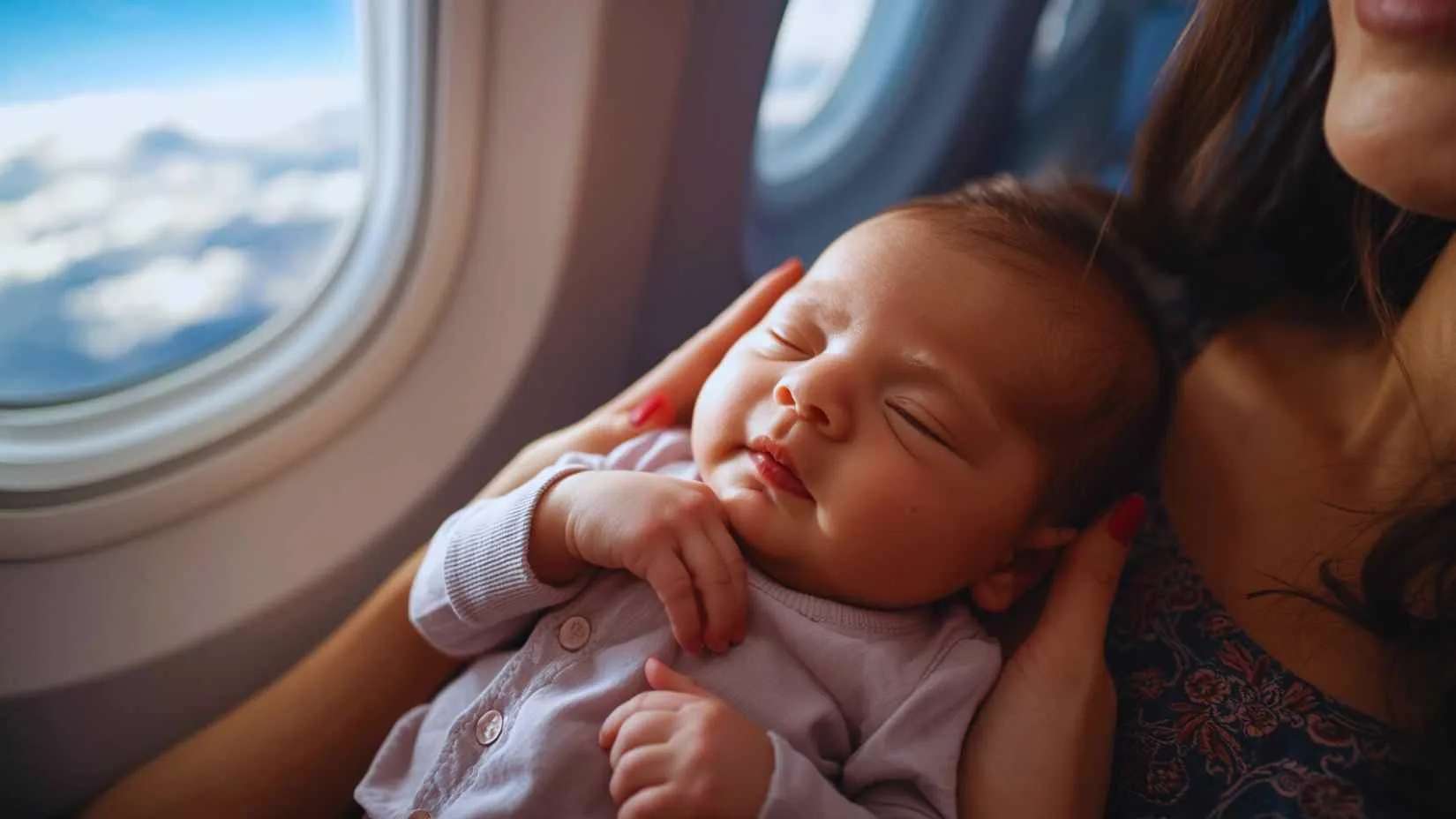Yes — it can be safe to travel by plane with a 1‑month‑old baby, but it depends a lot on the baby’s health, maturity (especially if full‑term), your destination & flight duration, and you’ll need to take special precautions. Always check with your paediatrician before booking.
Taking an airplane trip when you have a very young baby (for example, a 1‑month‑old) can feel both exciting and nerve‑wracking.
You’re eager to travel, maybe visit family, or go on holiday — but you also have a tiny little human whose immune system is just getting started, whose ears might feel changes in cabin pressure, and whose schedule is very dependent on feeding, sleep and comfort.

Can We Travel With 1 Month Old Baby In Flight?
If you can travel with a 1‑month‑old baby on a flight, what medical experts say, what you need to check, and how to prepare for a smooth journey. I’ll include references to paediatric sources and explain the key factors you’ll need to consider.
Many airlines will allow infants to fly at very young ages (some just a few days old), but from a health perspective experts often recommend waiting longer when possible. For instance:
-
The Mayo Clinic says air travel is typically safe for most healthy, full‑term infants after the first few weeks, but warns that any infant with heart or lung problems should be cleared by a healthcare professional. Mayo Clinic
-
The American Academy of Pediatrics (via the site HealthyChildren.org) recommends avoiding flying with a newborn until they are at least 7 days old, and ideally waiting until two or three months. HealthyChildren.org
-
A blog from a travel‑parent site notes that although full‑term babies maybe ready to fly at ~1 month, most doctors recommend waiting until 3–6 months especially for longer trips, to allow immune and respiratory systems more time to develop. Berkshire Hathaway Travel Protection
So, a 1‑month‑old can travel, but it may carry increased risks and more preparation is required.
What are the key medical / health concerns?
When you’re considering flying with a 1‑month‑old baby, here are the main issues to keep in mind:
-
Immune system vulnerability: Babies at this age have a still‑developing immune system, which makes them more susceptible to infections. Crowded airports, enclosed cabins, other passengers with colds — all raise the risk of exposure. Parents+1
-
Respiratory / lung maturity: If the baby was premature, had lung problems or heart issues, the lower cabin pressure and reduced oxygen may pose added risks. Mayo Clinic highlights that infants with lung or heart issues should have medical clearance. Mayo Clinic
-
Ear (pressure) changes: During take‑off and landing the cabin pressure changes; babies cannot equalize ear pressure as well as older children/adults, which can cause discomfort or ear pain. Experts recommend having them feed or suck during these phases to help. Cleveland Clinic+1
-
Noise / environment / schedule disruption: The airplane cabin is noisy, unfamiliar, and may disrupt the baby’s feeding and sleeping rhythm. These can add stress for both baby and parents. The Bump+1
-
International travel + destination risk: If you’re travelling internationally, you also need to think about vaccinations, local health care availability, travel insurance, altitude, time zones, and so on. The Centers for Disease Control and Prevention (CDC) resource for “Traveling Safely with Infants and Children” highlights these concerns. CDC
What medical/doctor’s advice should you seek?
Before you book a flight, especially with a 1‑month‑old, you should:
-
Talk to your paediatrician: Ask if your baby is healthy and mature enough for flying. If they were premature, had neonatal complications, or have any medical condition, you’ll likely need clearance.
-
Check the baby’s post‑natal check‑ups: Make sure feedings, weight gain, and other health markers are on track.
-
Ask about vaccinations: While most immunisations start a bit later, the doctor may advise on protecting the baby from exposures during travel.
-
Discuss destination‑specific risks: If travelling internationally to area with known infectious disease risks, altitude changes, or limited medical resources, you’ll want a plan.
-
Get a written note (if required by airline) especially if baby is very young or has a medical condition.
Read Next: 10 Best Food Festivals In The World | Top Foodie Destinations
Practical travel considerations & airline logistics:
Here are what you’ll want to plan for if you decide to travel with a 1‑month‑old:
1. Airline / booking considerations
-
Check the minimum age policy of your airline. Some carriers may require infants to be a certain age (e.g., 2 days, or 1 week) and may request a doctor’s note for very young babies. vaba.io
-
Decide whether the baby will sit on your lap (infant in arms) or you purchase a seat and use a travel‑approved car seat. The FAA and other safety bodies recommend that the safest option is a properly secured child seat rather than your lap. HealthyChildren.org+1
-
Book a seat with more space if possible (bulkhead, aisle, etc) so you can access baby easily.
-
Ask for a bassinet or infant‑friendly seat (some airlines provide them for long‑haul flights).
-
Check baggage/gear allowances for baby‑items (stroller, car seat, diaper bag).
2. Packing / on‑board preparation
-
Feed baby during take‑off and landing (breast or bottle) to help with ear pressure. Cleveland Clinic
-
Bring extras: diapers, wipes, change of clothes for baby (and maybe parent), blankets, pacifier, soothing toy. Be prepared for delays. The Bump+1
-
Baby‑wear or carry the baby through security for easier movement. Some parents prefer a carrier so you have your hands free. Curitas Pediatrics
-
Think about seat location: Aisle may allow easier movement; window might be less disturbed; but prefer a spot where you can quickly get off if needed.
-
Hygiene: Wash/sanitise hands often, especially before touching baby. Exposure to germs is higher in airports and planes.
-
Sleep routine: Try to time flight according to baby’s usual sleep/feed schedule if you can. Bring familiar items. The Bump
3. Destination / arrival considerations
-
Make sure your destination has appropriate baby‑friendly medical facilities, in case you need them.
-
Consider the time change, climate, altitude, and whether baby’s routine may be disrupted.
-
Avoid overly crowded or high‑risk environments immediately after arrival (the baby may need some time to adapt).
-
Stay close to home base initially if the baby is still very young and monitor their health during the trip.
When you shouldn’t fly with a 1‑month‑old:
It may be wise to postpone or avoid travel if:
-
The baby was premature, had lung/heart/respiratory complications.
-
The baby has a recent infection or is due for a major vaccination shortly.
-
It’s a very long flight, especially if many time zones are crossed or you’ll be in a high‑altitude destination.
-
The destination lacks suitable medical facilities for infants or has high risk of infectious disease.
-
You as a parent are extremely tired or recovering from major surgery/delivery — you’ll need to be very alert and able to care for the baby.
Summary of pros & cons:
Pros:
-
You can still travel and see loved ones or enjoy a holiday.
-
Very young babies often sleep a lot and may adapt to travel more easily in some ways than older kids. Some parents report 1‑month‑old was calm. The Sun
-
If you plan well and choose seats/gear wisely, the trip can be successful.
Cons / risks:
-
Immune/health risk higher for newborns.
-
Pressure changes, unfamiliar environment may upset baby.
-
You need extra gear, planning, possibly higher cost (seat, car‑seat, medical check).
-
Unexpected delays/disruptions can be harder with a 1‑month‑old.
-
Your baby’s paediatrician – key person to consult for your baby’s specific health condition.
-
Your airline – each has its own policy on infant travel (age minimums, seat vs lap, bassinets, etc).
Using these keywords will help your blog post match search intents from parents asking “Can we travel with a 1‑month‑old baby on a flight?”, “Is it safe to fly with a newborn?”, “What to prepare when flying with infant?” etc.
According to Doctor:
-
Mayo Clinic: “Air travel is typically safe for most healthy, full‑term infants after the first few weeks.” Mayo Clinic
-
The HealthyChildren.org article: “Generally, you should avoid flying with your newborn until they are at least 7 days old. Ideally, wait until your baby is two or three months old to fly.” HealthyChildren.org
-
Cleveland Clinic: Provides tips about feeding during take‑off/landing to avoid ear pain and protecting hearing with noise reduction. Cleveland Clinic
-
CDC Yellow Book: Advises special preparation for infant travellers and highlights common pediatric travel risks like respiratory/diarrhoeal illnesses. CDC
FAQs:
1. Is it safe to fly with a 1-month-old baby?
Yes, it’s generally safe to fly with a healthy, full-term baby after the first few weeks. However, consult your pediatrician if the baby has any health issues or was born prematurely.
2. When is the best time to fly with a newborn?
Experts recommend waiting until the baby is at least 7 days old, with a preference for waiting until 2–3 months for a safer, more comfortable journey.
3. Can the baby fly on my lap or do they need their own seat?
Babies under 2 years old can often fly on your lap, but it’s safer to book a separate seat and use a car seat. Some airlines provide bassinets for infants on long-haul flights.
4. How can I prevent my baby’s ears from hurting during the flight?
Breastfeeding, bottle-feeding, or giving the baby a pacifier during take-off and landing can help equalize ear pressure and prevent discomfort.
5. What should I pack for a flight with a 1-month-old?
Pack diapers, wipes, a change of clothes for both you and the baby, bottles, a pacifier, a blanket, and any other comfort items your baby uses.
6. Can I fly with a sick baby?
It’s not recommended to fly if your baby is sick, especially with a respiratory or fever-related illness. Always check with your pediatrician if your baby shows signs of illness before flying.
7. What health precautions should I take while traveling?
Make sure your baby’s vaccinations are up to date, wash hands frequently, and protect your baby from exposure to crowds or sick individuals.
8. What do I do if the baby gets upset on the flight?
Try to comfort your baby with feeding, soothing, or gentle rocking. Keep their routine as close as possible to normal to reduce stress for both of you.

